Artificial intelligence is no more a future buzzword, but an essential tool shaping how businesses live in this world. Gartner predicts that customer service operations will use AI in 25% of its functions by 2025. This blog will walk you through how to leverage AI agents and how to start using AI Agents to transform your business, elucidate the advantages of incorporating them, and then how to bridge them with your business strategy.
The AI Revolution in Business
In this day and age where the market moves fast, Businesses need to adapt. AI agents are a kind of software program that reflects human behavior and decision-making, they can help to automate and replicate tasks and increase customer engagement while increasing operational efficiency.
For new startups or mature enterprises, embedding AI agents in your workflows is a walk to revolutionize your business processes and render gain over competition.
The change is not in uprooting your team, but it’s working with strategic initiatives handled by staff and AI takes care of the repetitive. AI agents can help in improving the customer care experience and operations and will even let you build new income streams.
Must Read this: How to Build Solid Brand Authority
What Are AI Agents? (Start using AI Agents)
AI agents are autonomous software programs running on servers or devices that employ artificial intelligence in order to work things that usually require human actions. Chatbots from basic to sophisticated systems like automate some queries with inbuilt responses or analyze large datasets and take predictive decision.
Characteristics that distinguish the typical AI agent
- Automation: Automating repetitive tasks
- Reinforcement: Most AI agents learn to improve their performance over time through machine learning.
- Interaction: they interact with customers/staff members via NLP
For example, we see that a lot of the AI applications in the wild today are chatbots built onto websites to give 24/7 customer service. Chatbots can ask common questions, assist users through the purchasing journey, and if deemed necessary escalate problems to a live human. The mix of automation and humans is redefining customer support.
The Benefits of Using AI Agents
Adopting AI agents offers several tangible benefits that can help transform your business:
1. Improved Customer Experience
AI agents provide immediate responses to customer questions, which saves time and increases satisfaction. They can multitask easily so your customers will not be served by another department. The improvement in customer satisfaction scores for companies that use AI to drive customer service has been as high as 30%, according to Forbes.
2. Operational Efficiency
AI agents eliminate the time wasted of your staff on repetitive jobs, allowing them to work on more important undertakings. That results in more production and lower costs of operations. From data processing, and scheduling, to managing the inventory, AI agents can perform tedious tasks.
3. Data-Driven Insights
The AI agents all the time amasses and scrutinize data from the interactions. It can also be very useful in understanding customer behavior, preferences, pand ain points. Marketing campaign tuning and strategy refining business could leverage these insights.
4. Scalability
AI systems scale easily and provide more work for no significant extra cost. As the business scales, AI agents can keep up with higher levels of traffic throughout peak times giving consistent performance.
5. 24/7 Availability
AI agents, unlike human workers, do not take breaks. Continuous service — great for businesses with an international target market as they can offer round-the-clock support. It can also boost your Public Relations and increase loyalty to customers.
The Place of AI Agents in Your Business
Implementing AI agents is so much more than an upgrade for your business, in fact it”s a complete business philosophy change. Some steps to ensure a smooth operation:

1. Analysis of Requirements and Goals
Identify The Areas Where AI Agents can Be Most Useful Before You Begin Implementation Of These In-depth Ask yourself;
- They are menial & time-consuming tasks.
- Where do the customers find causes for delays or at times bottlenecks?
- How AI can enhance your USP?
Fourth, perform an external audit (to see which processes can be automated and what KPIs we set for the AI integration.
2. Put Together a Good Business Model
Spill out how AI agents will become a part of your digital marketing and operational strategy. Identify what is going offer, the investment required, and the expected ROI Throw the goal in alignment with business-wide objectives (customer experience improving or operational efficiency getting better)
3. Opt for the Best AI Solutions and Platforms
There are several AI platforms on the market that provide a range of features. Examples are:
- Chatbot platforms: Drift, Intercom
- UiPath, Automation Anywhere
- IBM Watson, Google Cloud AI – Data Analytics and Insights
Consider these platforms in the context of criteria that are most important to you, i.e. integration capabilities, usability, scalability and pricing.
4. Train the Staff and Set up a Support System
AI agents are going to be built by teams Implementing AI agents is a collectively task. Tell your employees about the advantages and features of AI Train them on how to use AI agents, what data to look for and making a decision based on the insights from AI. This joint approach enables you to have frictionless integration.
Also, you read this Blog: What Is Business Marketing?
Steps to Implement AI Agents in Your Business
Once you’ve outlined your strategy, follow these practical steps to get started:
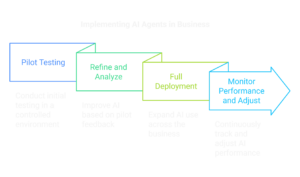
Step 1: Pilot Testing
Start off by doing a pilot in a more controlled situation. Let us push the AI chatbot to a single page or a single customer service area. Keep track of its performance, take the feedback, and measure response time, customer satisfaction rate, or conversion rates.
Step 2: Refine and Analyze
Confirm the bottom line for areas needing enhancement from pilot test results. Further tune the algorithms in the AI agent, tweak its response patterns, and deal with any integration glitches. You need to keep on improving — unlike the AI agents, your strategy should be agile and adapt over time.
Step 3: Full Deployment
Upon the success of the pilot phase, augment the scope of your AI agent for more domains in the business. Include CRM implementation, to use it for lead generation on your site or proliferate use across multiple channels of customer service.
4th Step: Monitor Performance and Adjust
Use thorough monitoring tools to monitor in real-time the performance of the AI agent. KPIs — resolution time, customer feedback scores & conversion rates Use your numbers regularly, double check the metrics, and change strategy accordingly to make sure that AI is remaining on track to serve your business needs.
Use Cases: Case Studies of AI Agents Disrupting Industries
Here are a few examples of the real impact that AI agents are making in practical universe :
Customer Service Automation
Utilizing AI chatbots to help with the hassle of customer queries during peak shopping seasons, for example, a global retailer. The response time was cut in half and the satisfaction of customers went up from 25% to… With such levels of efficiency, the human agents at the company were able to deal with more complex matters, thus raising the general quality of service.
Custom Marketing Campaigns
A mid-sized E-commerce firm employed the use of AI agents to do customer data analysis and personal messages. They achieved a 35% engagement & sales increase by adjusting emails and social media posts according to individual behavior of customers. This personalization boosts your core differentiator and creates long-term loyalty of customers.
Streamlined Operations
An AI agent in a logistics firm to automate scheduling and route optimization. The automation not only shrank operational overheads but also eliminated time to deliver goods, leading to a superior customer experience and better profitability.
They show how AI agents in general are an industry-agnostic solution for the specific problem area any business might face.
How to Implement AI Agents the Right Way
For optimal application of AI agents, check this book out to learn best practices:
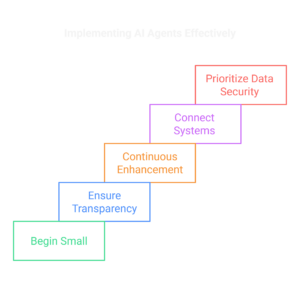
1. Begin Small, Scale Big
Do not attempt to automate everything using 100% no-code (ie inundate your organization with a couple hundred of scripts) and none of it is automated. Case in point, do 1-2 processes then iterate from there once you are comfortable and have insights.
2. Transparency
Make clear to your customer just who is running an AI agent or bot whilst they are interacting. The more transparent, builds trust and also assists in controlling expectations, especially in the space of customer service.
3. Keep working on enhancing
AI is not the end of the rope solution, just leave it! Keep your AI agents clean and refine them with what your performance data and customers remember. Continuous improvement keeps your tools working and optimizing towards the goals of your business.
4. Connect existing systems
AI agents need to play nicely in existing software and business processes for the problems to be automated seamlessly. That should be taken for granted, even while you are in CRM or marketing automation platform (API) tools whatsoever but getting them all “integrated” the key to unlocking higher powers of AI.
5. Over 9000! Prioritize Data Security
Take strong security measures to secure the data your AI agents are collecting and processing. Especially so in the face of growing data privacy risks and compliance demand.
Overcoming Challenges and Pitfalls
While AI agents offer significant benefits, there are challenges you need to be aware of:
Technical Limitations
AI agents are only as good as the data they are trained on. Poor-quality or biased data can lead to suboptimal performance. Ensure that your datasets are comprehensive and regularly updated.
Resistance to Change
Staff members may be hesitant to adopt new technologies. Address this by providing comprehensive training and demonstrating the tangible benefits of AI integration.
Cost Considerations
While many AI solutions offer impressive ROI, initial setup costs can be high. Budget carefully and consider the long-term savings and revenue gains when evaluating your investment.
Ethical Concerns
As AI becomes more integrated into customer interactions, ethical issues such as transparency and accountability become critical. Always prioritize ethical practices to build and maintain customer trust.
Passing the hurdles and pitfalls
There are a lot of positives that come from working with AI agents but challenges worth knowing too:
Technical Limitations
The quality of trained data is down to the AI agent that outputs. Low quality or biased data will result on sub-optimal performance so assess your datasets are all-encompassing and updated regularly.
Resistance to Change
But new technology might be too much for some staff to accept. Train well and exhibit the value of AI integration, things like this can be done.
Cost Considerations
Some AI solutions have super high ROI but require a heavier lift to get set up. Be mindful of the costs, and weigh those against future savings and revenue returns on which your investment is.
Ethical Concerns
customer interactions, because as AI grows more in-depth into customer-facing strategies transparency and accountability have become an essential ethical question. Don’t forget about ethical practices to keep & build customer trust.
Future AI Trends and Business Transformation
AI is a rapidly changing landscape. Moving forward, what to keep an eye on includes:
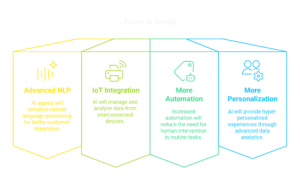
- 1st place Advanced Natural Language Processing (NLP): AI agents will learn to process and generate natural language even better which means better integration with the customer experience
- IoT Integration: With the masses connecting devices themselves, AI agents will be central to managing and analyzing the data of the Internet of Things.
- More Automation: More intricate processes will automate so human touch would be required just for routine jobs.
- More Personalization: AI agents will leverage the deeper data analytics to provide nearly hyper-personalized customer experiences that lead to what are now at typically high levels of customer satisfaction and loyalty.
Most importantly, being up to date about those trends and regularly reviewing your strategy will be necessary to keep your business updated and competitive in the evolving face of digital transformation.
Conclusion
AI agents are no longer a nice-to-have for modern businesses; it is a must-have strategy. Technology keeps evolving and AI provides the next level of options to innovate on ways of enhancing customer experience, supporting operations, and achieving business growth. Start small, ramp up incrementally, and iterate your way through the power of AI to be able to change your business.
Be it a digital marketing strategy for a startup or the intentional efforts towards innovation in an established organization; AI agents shall provide the tools you require to stay on top. From enhanced customer engagement to major efficiencies in the yard, now is the time to invest in AI.
Using the top tips above and keeping up with the new trends that are building, make your business already take advantage of AI agents. Digital transformation — the future is now…take action and use AI to take your business to the next level.
FAQs
What is an AI agent?
An artificial intelligence (AI) agent is a software program that uses artificial intelligence techniques (e.g., machine learning and natural language processing) to make decisions without human intervention. Think from the perspective of chatbots in customer support, or large sets data analysis systems for achieving desirable outcomes.
What can AI agents do to improve the customer experience?
AI Agents respond quickly to customer queries, provide personalized recommendations as well as efficiently resolve problems. Hence faster service and customer satisfaction due. Click here for more info, Gartner
Are AI agents really that costly to deploy?
While the initial costs involved can be substantial, the long-term health (reduced operating expenses and higher efficiencies) often makes it justifiable. This is where businesses that grow gradually tend to get the highest return on investment.
How to include AI agents in your business?
Start a pilot by automating one process only, collect performance measurements and refine the system before a full-fledged deployment. Success is achieved by integrating with your current systems and ongoing monitoring.
What are some examples where AI agents are used in real life?
these are the best usecases for an AI Agent: customer service chatbots, personalization campaigns, scheduling and operations systems level, big data-driven analytics implementations These applications can make your operations simpler and better customer engagement.
AI agents come with a whole new set of challenges — how do you reinvent the human role?
AI agents are intended so that you can do automatically repetitive work the folks have to be occupied with greater strategic duties. This may increase the feeling of fulfillment and productivity.

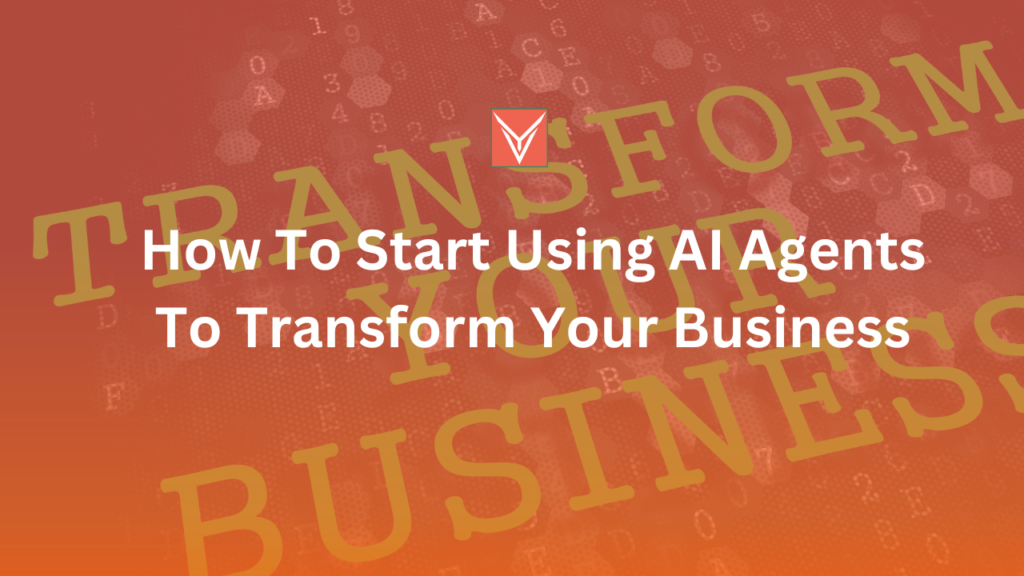


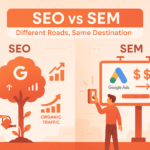






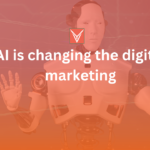
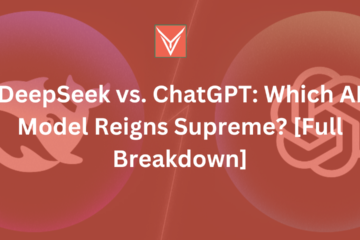

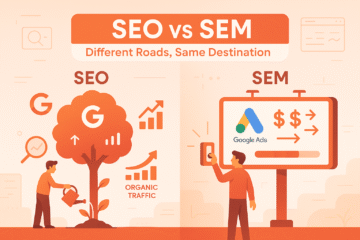
very informative articles or reviews at this time.
You’re so awesome! I don’t believe I have read a single thing like that before. So great to find someone with some original thoughts on this topic. Really.. thank you for starting this up. This website is something that is needed on the internet, someone with a little originality!
You’re so awesome! I don’t believe I have read a single thing like that before. So great to find someone with some original thoughts on this topic. Really.. thank you for starting this up. This website is something that is needed on the internet, someone with a little originality!